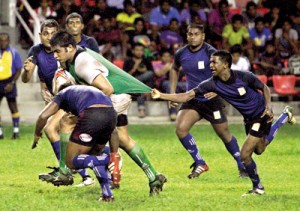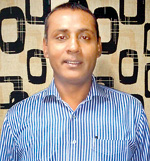IRB and ARFU sanctions will be their top priorities
Despite setbacks faced in the past year, Nazim Mohamed, the newly elected General Secretary of the Sri Lanka Rugby Football Union (SLRFU) was affirmative that it can recover to become a more professional sporting entity within a matter of time. According to Mohamed, the new set of SLRFU office bearers headed by former its former boss Asanga Seneviratne, are unison in taking rugby into the next level.

Taking Sri Lanka Rugby into the next level
“First thing first, as at present our priority is to put back the administrative structure in its proper place. The SLRFU during the past 10 to 12 months, just carried on with the national side and the top domestic competitions. Since all the Sub Committees were declared null and void, when the elected SLRFU body was dissolved, operations did not take place as usual and as planned. As a result, the SLRFU had to forgo many plans,” Mohamed told the Sunday Times.
After debates, confusions and risks of facing possible sanctions from their global and regional bodies, the Ministry of Sports opened nominations forwarded for the SLRFU elections on March 8. The Ministry of Sports through a letter signed by its Director General, K.D.S. Ruwanchandra on March 28, officially notified the appointment of SLRFU’s new officials consisting of four office bearers and seven council members.
With no other nominations coming forward Seneviratne was elected the President while Lasitha Gunaratne was elected the Vice President. Both held the same positions when the then Minister of Sports, Naveen Dissanayake dissolved the SLRFU appointees in May 2015 and appointed the ministry Director General, K.D.S. Ruwanchandra, as the Competent Authority. With former General Secretary Nalin de Silva and Treasurer Kiran Atapattu deciding not to contest, Nazim Mohamed and A.A.M. Riyaz were elected unopposed.

Nazim Mohamed
The Council Members are Fazal Mohamed, Roshan Deen, Tuan Dole, Rtd. Brg. Sunil Ranasinghe, Iftikar Abdul Wahid, Shamrath Fernando and Jude Pillai. With this set of officials, SLRFU Secretary Mohamed believes that it can make up with all what was missed and even focus more on broad-basing the game with viable and concrete decision making.
“Initially what we are looking at reappointing the defunct Sub Committees, so that we can start off somewhere. Then our challenge will be to set a road map for the next two to three years. What we are trying to focus on is purely development, we are getting the schools section, the referees’ society and the provincial unions into the stream. As at now all have responded positively and are looking pretty much optimistic in getting involved in our journey. Without cohesive intentions and thoughts, we cannot think of a positive development. Now, I suppose, all have the same intentions of taking the game forward,” Mohamed added.
According to Mohamed SLRFU will be looking to lay their focus on a new Under-21 and Under-24 age group competition and developing women’s rugby in addition to reassessing the Division ‘B’ and ‘C’ competitions, which are run in without a proper structure at present. They are also looking at building provincially based teams as well as referees associations with the sole aim of sharing out responsibilities to the regions. These plans, however, are still at its initial or discussion stage.
“To come out with our fully laid-out plans, it will take at least a month or so from now. What we are doing at the moment is to get ourselves organised quickly as possible. Soon after everything falls into line, we will come out with our mission statement,” Mohamed went on to say.
In April 2015, the World Rugby (IRB) and Asian Rugby Football Union (ARFU) warned Sri Lanka to conduct its elections or the annual general meeting in accordance to the game’s constitution or face the risk of being banned internationally. The ARFU sent a demanding letter addressed to SLRFU chief Seneviratne, copied to the IOC, IRB, ARFU, all International Sports Federations concerned and the National Olympic Committee of Sri Lanka. This letter had questioned if the SLRFU is required to hold its elections under the Sports Law of Sri Lanka. The matter was temporarily addressed by appointing a Competent Authority in May 2015 but the IRB and ARFU continued corresponding directly with SLRFU officials even till now.
“I don’t know if there had been a problem in the recent months but since our appointments came into affect two weeks ago we are yet to hear anything unacceptable from our regional or global bodies. So far all seems to be placed well and we will move on with our positive journey,” Mohamed stressed.


